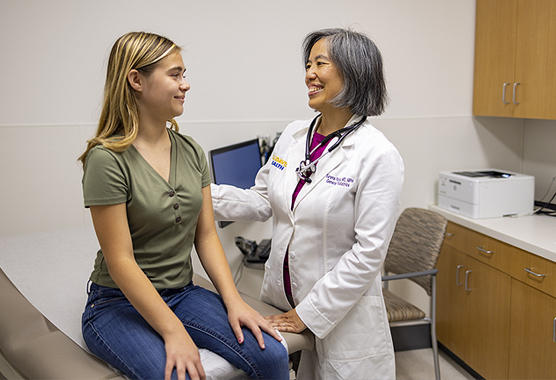Mononucleosis
Mononucleosis (mono) often affects teens and young adults, causing extreme fatigue and other prolonged symptoms. We offer expert diagnosis and care for this contagious viral infection.
Medically reviewed by Daniel Dodson, M.D. on Nov. 09, 2023.

What Is Mononucleosis (Mono)?
Mononucleosis, more commonly called mono, is most commonly caused by a contagious viral infection. It mostly affects teens and young adults, but younger children get it too.
The primary symptom – extreme fatigue – can make it difficult to attend school, work and socialize. Some people call mono “the kissing disease” because the virus can spread from person-to-person through saliva.
Our UC Davis Health physicians help you recover from mono while lowering the risk of infecting others. Children and teens with mono receive specialized care from our pediatrics team.
Symptoms of Mono
Mono causes symptoms similar to colds or flu (influenza). Symptoms often occur gradually, usually 4 to 6 weeks after exposure. Teens and young adults tend to have more severe symptoms than children.
Common Symptoms
You or your child may experience:
- Extreme fatigue or weakness
- Fever and chills
- Headache
- Loss of appetite
- Muscle weakness or aches
- Rash
- Sore throat
- Swollen lymph nodes in the armpits, neck or groin
Emergency Symptoms
Mono can enlarge the spleen, an organ that helps fight infection. An enlarged spleen can rupture, usually after trauma, including during contact sports. This can cause life-threatening internal bleeding. Patients with mono should be evaluated before participating in activities that could lead to trauma to the spleen. Seek emergency care for signs of a ruptured spleen, such as:
- Abdominal pain or tenderness
- Blurred vision
- Dizziness or confusion
- Fainting
- Low blood pressure
Causes of Mono
Different infections cause mono, though Epstein-Brr virus is most common. These contagious germs spread from one infected person to another in bodily fluids.
Epstein-Barr virus (EBV)
Epstein-Barr virus (EBV) causes most cases of mononucleosis. EBV is a type of herpes virus. Most people get EBV at some point in their lives, but not everyone who’s infected develops mono.
Other Viruses
Other infections that cause mono include cytomegalovirus (CMV), herpes viruses, toxoplasmosis, HIV, and viral hepatitis.
Risk Factors for Mono
These factors increase your risk of mono:
Age
Mono most commonly affects people between 15 to 30 years of age. College students are particularly at risk.
Exchange of Bodily Fluids
Contact with an infected person’s saliva, blood or semen spreads the virus. Kissing or unprotected sex increases your risk. You may also become infected through a blood transfusion or organ transplant.
Sharing Personal Items
Viruses that cause mono can live on toothbrushes, eating utensils, cups and other items. Sharing these items with others increases your risk of exposure.
Diagnosis and Testing
Our physicians expertly diagnose mono based on:
- Symptoms and risk factors
- Physical exam that includes checking for enlarged lymph nodes, spleen and liver
- Blood tests to look for antibodies and high number of white blood cells that indicate infection
Treatments for Mono
There isn’t a specific medication for mono. The infection typically clears up within four weeks with at-home care. People with mono should talk to their provider before participating in activities that might injure their spleen, leading to serious complications.
Fluids
It’s important to drink lots of fluids and stay hydrated while recovering from a viral infection.
Medications
Over-the-counter nonsteroidal anti-inflammatory drugs (NSAIDs) help ease pain, fever and muscle aches.
Rest
Extreme fatigue is a common mono symptom. Sleep and rest can give your autoimmune system the boost it needs to fight the infection.
Preventing Mono
There isn’t a vaccine to prevent mono. But these steps may lower your risk:
Practice Good Hygiene
Don’t share food, drinks or personal hygiene items with someone who’s ill.
Use Protection
Viruses that cause mono can spread in semen. Wearing condoms is the best way to lower your risk of sexually transmitted infections (STIs).
"Mononucleosis," American Academy of Family Physicians, https://familydoctor.org/condition/mononucleosis/
Who does it affect?
1 in 4Young people infected with the Epstein-Barr virus develop mono
Sources: CDC: About Infectious Mononucleosis
Request an Appointment
As Sacramento's No. 1 hospital, you'll benefit from unique advantages in primary care and specialty care. This includes prevention, diagnosis and treatment options from experts in 150 specialties.
Referring Physicians
To refer a patient, submit an electronic referral form or call.
800-4-UCDAVIS
Patients
Call to make an appointment.
Consumer Resource Center
800-2-UCDAVIS

Ranked among the nation’s best hospitals
A U.S. News & World Report best hospital in cardiology, heart & vascular surgery, diabetes & endocrinology, ENT, geriatrics, neurology & neurosurgery, and pulmonology & lung surgery.

Ranked among the nation’s best children’s hospitals
U.S. News & World Report ranked UC Davis Children’s Hospital among the best in pediatric nephrology, orthopedics*, and pulmonology & lung surgery. (*Together with Shriners Children’s Northern California)

Ranked Sacramento’s #1 hospital
Ranked Sacramento’s #1 hospital by U.S. News, and high-performing in aortic valve surgery, back surgery (spinal fusion), COPD, colon cancer surgery, diabetes, gynecological cancer surgery, heart arrhythmia, heart failure, kidney failure, leukemia, lymphoma & myeloma, lung cancer surgery, pacemaker implantation, pneumonia, prostate cancer surgery, stroke, TAVR, cancer, orthopedics, gastroenterology & GI surgery, and urology.

The nation’s highest nursing honor
UC Davis Medical Center has received Magnet® recognition, the nation’s highest honor for nursing excellence.

World-class cancer care
One of ~59 U.S. cancer centers designated “comprehensive” by the National Cancer Institute.

A leader in health care equality
For the 13th consecutive year, UC Davis Medical Center has been recognized as an LGBTQ+ Healthcare Equality Leader by the educational arm of America’s largest civil rights organization.

